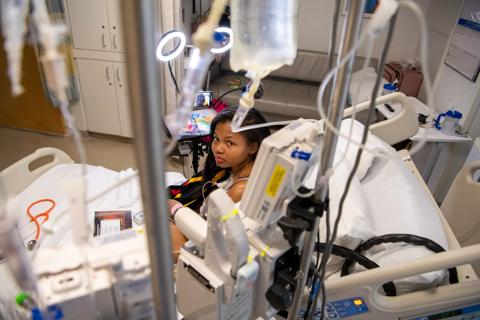Study assesses the impact of donor source and post-transplant prophylaxis for patients receiving a hematopoietic cell transplant

In patients undergoing reduced intensity transplant for acute myeloid leukemia, acute lymphocytic leukemia or myelodysplastic syndromes, a recent study found there was no significant difference in late graft failure rates between those with haplo-identical donors (haplo-HCT) vs. those with matched unrelated donors (MUD-HCT) receiving post-transplant cyclophosphamide for graft-vs-host disease (GVHD) prophylaxis.
Advertisement
Cleveland Clinic is a non-profit academic medical center. Advertising on our site helps support our mission. We do not endorse non-Cleveland Clinic products or services. Policy
Previous studies have reported comparable survival outcomes in patients receiving traditional calcineurin inhibitor-based GVHD prophylaxis for transplants from matched unrelated donors versus haplo-identical donors receiving post-transplant cyclophosphamide. However, patients receiving haploidentical transplantation may be more likely to receive post-transplant cyclophosphamide to prevent graft versus host disease.
“Post-transplant cyclophosphamide has more recently come into use for transplants from matched unrelated donors,” says Claudio G. Brunstein, MD, PhD, study co-author and vice-chair of the Department of Hematology and Oncology at Cleveland Clinic’s Taussig Cancer Institute. “It was important to understand if there was difference in graft failure or rejection associated with its use.”
In evaluating graft failure and its association with use of post-transplant cyclophosphamide, donor source or both, there was no difference between risk of serious outcomes such as late graft failure or rejection between haploidentical and unrelated donors, according to the study results, which were presented at the 2022 American Society of Hematology (ASH) annual meeting. At two years, the adjusted probability of late graft failure for the haplo-HCT group was 6.5% (95% CI 5.2-8.0) versus 5.9% (95% CI 2.7-10.9) for the MUD-HCT group (p = 0.785).
“The other part of the study has to do with the impact on overall mortality between the two groups,” says Brunstein. “As has been reported previously, we found that the haploidentical donor cohort had significantly higher rates of overall mortality.”
Advertisement
The two-year overall survival was 56% (95% CI 53-39) for the haplo-HCT cohort, compared with 69% (95% CI 61-75) for the MUD-HCT group (p=0.001). “The important finding was that overall mortality was not directly affected by graft rejection,” explains Brunstein. “The risk was related to various factors such as toxicity, infections and side effects due to transplant and disease.”
Using the Center for International Blood and Marrow Transplant Research database, researchers conducted a retrospective cohort analysis of 1,336 adult transplant patients with initial engraftment following haplo- or MUD-HCT. Overall, 60% of patients had AML, 18% had ALL, and 22% had MDS. All patients had undergone reduced intensity conditioning prior to receiving transplantation, with post-transplant GVHD prophylaxis with cyclophosphamide calcineurin inhibitor/mTOR inhibitor and mycophenolate.
Researchers compared incidence of late graft failure (defined as any graft failure following primary neutrophil engraftment) in 1,151 patients who received a haplo-identical HCT versus 185 who received a MUD-HCT between 2011 and 2018.
In multivariate analysis, factors linked with an increased risk of graft failure included a diagnosis of MDS, HR 1.98 (95% CI 1.22-3.20, p=0.005) and being transplanted in the earlier time period (2015-2018 vs. 2011-2014 HR 0.39, 95% CI 0.24-0.64, p=0.0002).
In multivariate analysis, risk factors significantly associated with overall mortality included haplo-HCT, HR 1.46 (95% CI 1.11-1.91, p-value = 0.007), high risk disease, HR 2.31 (95% CI 1.87-2.84, p= <0.0001), HCT comorbidity score of 3 or higher, HR 1.34 (95%CI 1.13-1.58, p=0.0007) and a diagnosis of ALL, HR 0.51 (95%CI 0.39-0.67, p=<0.001).
Advertisement
On average, the MUD-HCT patients were older (65 vs. 61 years). The researchers performed a post-hoc sensitivity analysis to evaluate the effect of donor age between donor types on graft failure. Selection of participants between 18-49 years old from both groups provided a sub-cohort of 1,078 patients (78% or 898 haplo-HCT, versus 97% or 180 MUD HCT). “When adjusted for donor age, graft failure did not differ between haplo-HCT and MUD-HCT HR 1.19 (95% CI 0.53 – 2.69, p=0.6731),” Brunstein says.
Advertisement
Advertisement

Insights on ex vivo lung perfusion, dual-organ transplant, cardiac comorbidities and more

Insights on bringing Cleveland Clinic even closer to becoming the best transplant enterprise in the world

Consensus statement aims to increase use of the perfusion technology and raise transplant volumes

Minimally invasive pancreas-kidney replacement reduces patient’s pain, expedites recovery

AHA recommendations for pretransplant evaluation, peritransplant and long-term management

First-ever procedure restores patient’s health

The agent-based model aims to improve prediction accuracy

New guidelines expand on psychosocial, sexual health, cognitive and other issues